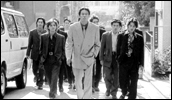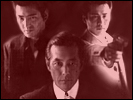Family
- Year
- 2001
- Original title
- Famiri
- Japanese title
- ファミリー
- Director
- Cast
- Running time
- 108 minutes
- Published
- 1 May 2001



by Tom Mes
I guess it had to happen sooner or later. Takashi Miike's output and its sustained level of quality have bordered on the superhuman for a good while now, but with Family comes the proof that Miike too is indeed fallible like all of us mortals.
Based on a manga series of the same name, Family is a tough-guy action movie with the brain cells in standby mode. The story deals with a small yakuza family whose members keep getting kidnapped, tortured, or otherwise humiliated by rival groups, leaving godfather Koichi Iwaki (the unsung hero of many video action movies, who, it must be said, has great on-screen presence) to get revenge time and again, usually by driving a truck or tank through the wall of the enemy hide-out, killing everyone inside and rescuing the relative in question all by himself. All of this is accompanied by a loud metal score (courtesy of Japanese hardcore band Monkey Pirates), which quickly grows repetitive and tedious. Much like the whole film does, in fact. By the time we get to the uninspired and shockingly brief finale (in which Iwaki and Taishu vanquish a small army of Rambo types in less than twenty seconds, most of which takes place off-screen) you'll be wondering if this film was really made by the same person who gave us the overwhelmingly brilliant Dead or Alive and Audition.
Like Miike's previous production Visitor Q (which played Tokyo screens at the same time as this film), Family was shot on digital video. Watching it, you get the sense that Miike's main reason for making the film was to experiment with digital video and digital editing techniques. Superimpositions, various forms of noise and distortion, blue screen shots - a whole range of digital post-production trickery has been let loose on it, most of them without much connection to the dramatic development of characters or story.
If only Miike had paid as much attention to the dramatic aspect as he did to the technicalities, he might have had something. The basic material of Family is no worse than that of many of the director's previous works, but while he managed to create something truly memorable out of something mediocre on many occasions in the past, this time the result shows only the odd glimpse of Miike's imagination, leaving us with something sadly more akin to an 1980s sub-Schwarzenegger movie than to Dead or Alive or Ley Lines.